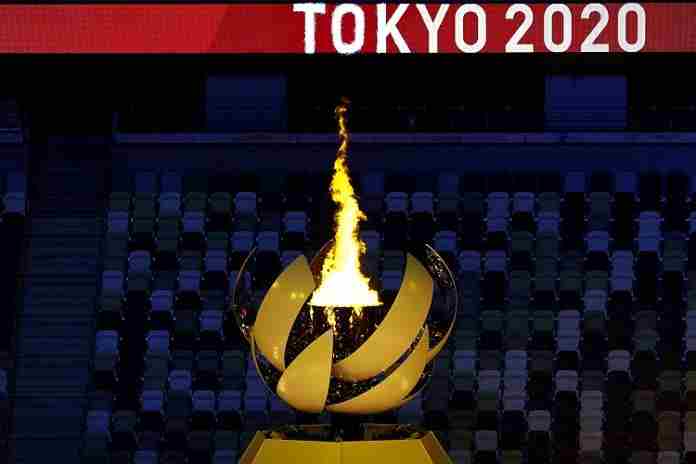(★ Friends: With the wonderful generosity of 51 donors, 89% of our current server & support bill has been covered. If you enjoy this site, please donate here. Your help is so very much appreciated. Thank you. ★)
“Let us not forget the IOC itself, and the stakeholders of the Olympic Movement, who resolutely refused to take the easy way out by giving in those who were shrill with doubt and ready to quit, but who persevered on a road that may have been windy, always moving forward in pursuit of an objective that was, after all, achieved.
“That is an element of the Olympic spirit from which we can learn at least two things. First, that nothing is impossible, and second, that the Movement we represent, when it works together, is far stronger than we might have believed.”
That was Canada’s Dick Pound, 79, a 43-year member of the International Olympic Committee, speaking to his colleagues at the close of the IOC Session in Tokyo on Sunday morning. He touched on the keys to the success of the Tokyo Games, which succeeded on new levels that we unimagined when Tokyo was awarded the Games back in 2013.
That the Games happened at all was amazing and was a joint effort by the IOC and especially its President, Thomas Bach (GER). Layers of activities, program and parties that had been built up at the Games over the last 30 years were discarded and the organization of the Games was simplified … to the extent that a behemoth with 339 events and 11,000-plus athletes can be made simple.
Tokyo 2020 chief executive Toshiro Muto told the IOC that the organizing committee came into the Games with 7,000 staff and 70,000-plus volunteers, virtually all of whom will be back to their pre-Games lives within a few months.
Said Bach to Muto and Tokyo 2020 chief Seiko Hashimoto:
“Ms. Hashimoto, Mr. Muto, all our gratitude, all our respect there to you, to the people in the organizing committee and to the Japanese people, who have done an outstanding job which we will never, ever forget. Thank you very much on behalf of the Olympic Movement.”
They received a standing ovation from the IOC membership.
Remember the “Cancel the Tokyo Olympics to protect our lives” petition launched on 5 May and that garnered more than 200,000 signatures in its first 49 hours? It had 459,303 as of Monday evening Tokyo time and what impact did it have? None.
The continuous predictions of the Covid apocalypse had some significant impacts – no spectators at the Games, even though crowds continued to attend J-League football matches – and a brutal program of testing, checking and re-testing of any connected to the Games. While the Covid totals in greater Tokyo did go up during the Games, the impact of foreigners coming to Japan related to the Olympics was tiny.
The 9 August Covid positive report from the Tokyo 2020 organizers showed a total of 458 positives from individuals related to the Games from 1 July on, with 249 of these (54.3%) from contracted workers who were Japanese residents. In fact, counting all categories, the Covid positives from residents of Japan totaled 307 (67.0%) and just 151 from those outside of the country.
That’s 151 out of more than 42,711 individuals who entered Japan through its airports and were tested on arrival by the Japanese government. That’s 0.0035 percent or 35 per 10,000. Only 29 were athletes (!); 115 were officials or host broadcast personnel; 26 media and 29 Tokyo 2020 staff or volunteers. That’s spectacular.
The testing report through 7 August showed that there were 33 athletes and team officials – folks living in the Olympic Village – who tested positive from 284,931 tests for 0.01%. That’s hardly the great super-spreader event warned of by a few Japanese health officials or academic clinicians. They got it wrong, very wrong.
That was because the organizers, the IOC, and the Japanese government implemented the same key element of success that athletes and so many others use for success: discipline. Much of the angst about the Games had to do with the public frustration over the government’s response to the virus. This is normal, the Games are so popular worldwide that it becomes a way to swipe at the government when other means have little to no impact.
No matter. The Games went on, and with stunningly little drama away from the field of play. The host country went crazy, winning 58 medals when it’s best-ever had been 41, and 27 golds, surpassing its old record of 16 at the 1964 Games in Tokyo and matched in 2004.
That helped to send the national TV ratings through the roof, with reports that 90% of the entire population of the country was watching at least some of the Games on a daily basis.
There were historic showdowns, such as Australia’s Ariarne Titmus against American Katie Ledecky in the pool, Norway’s Karsten Warholm and Rai Benjamin of the U.S. in the greatest 400 m hurdles race of all time, followed by another world record a day later from Sydney McLaughlin of the U.S. And who could not be touched by the saga of American gymnastics superstar Simone Biles.
Japan won three of the four Skateboarding events, crushed the field in the judo tournament and, stunningly, reached the semifinals in men’s football, losing 1-0 in Spain on a goal in the 115th minute.
That wasn’t the script, right? USA TODAY’s Rachel Axon wrote the day before the Opening Ceremony:
“With women’s soccer competition beginning before the opening ceremony of the Tokyo Games on Friday, five teams – including the Americans – knelt on the field before the start of their games.
“Given the statements, gestures, advocacy and activism athletes have been part of in recent years, it’s likely just the beginning of protests against racial and social injustice during these Games – no matter what the International Olympic Committee says.”
The IOC loosened its rules to allow “expression” prior to the start of a competition – during introductions, for example – but continued its ban on protests during ceremonies. There were a grand total of two trivial incidents: U.S. shot putter Raven Saunders crossing her arms for photographers after the awards ceremony for her event and two Chinese track cyclists wearing a Chairman Mao pin on the podium. Inquiries were started on both; the China matter was resolved with a promise of non-recurrence; Saunders’ mother died two days after her event and the IOC has suspended its follow-up for now.
(Apologies for having Jessica Ramsey instead of Saunders named earlier; thanks to Shawn Price as the first to spot the error.)
All the loud voices from before the Games were hardly heard from; they either didn’t win a medal at all, or didn’t win gold. It’s not so easy to protest when you’re listening to someone else’s anthem.
The heat was high, but there were countermeasures in place and while omnipresent, had only a minor impact on a few sports, notably in tennis. Surprisingly, no doping positives were reported during the Games. There were some problems in transportation in the early, but these dissipated as the Games went on. The competitions were excellent and memorable and there was fan engagement at a new level.
This is important. Olympic Broadcasting Services chief Yiannis Exarchos (GRE) noted:
“What I think is the big opportunity here is … you have hundreds of millions of people around the world who are not simply watching. They are engaged. They have emotions, they want to do something, they want to share, they want to post a comment, they want to watch with their friends, they want to create the human network. …
“Most of the sporting venues follow the same concept from the Roman times, you know, their big arenas. Now we know there is so much more going beyond the physical presence of people. We will always miss if we [don’t have] physical presence but we can do so much more to show the actual connection that is going on.”
OBS came up with the concept of the “Virtual Fan Cheer,” in which a five-second video could be recorded and sent via a mobile app, to be shown online and in-stadium on the screens. Nice idea, but would it work? Bach, somewhat in awe himself, told the Session that messages had been received from fans of all 205 National Olympic Committees and “the number of videos having been sent is just incredible: it’s 250 million-plus.”
This is a signal of a paradigm shift in worldwide sport, not just in an Olympic Games without live spectators.
The IOC, the Tokyo 2020 organizers and the Japanese government and Tokyo Metropolitan Government saw benefits in sticking to their belief that holding the Games was better than canceling, that finishing was better than quitting and that for Japan, it could show itself how much it could achieve. All credit to all of them.
The protesters, the naysayers and the prophets of doom all lost; not that they care. There will be the issues of costs of the Games to be dealt with, the last Games to be awarded on the basis of building big instead of building small (or nothing) under Bach’s Agenda 2020. But in true democratic fashion, Japanese elections are coming this fall and voters will have a chance to weigh in on the government’s handling of the Games and a lot more.
Some 111 years ago, ex-U.S. President Theodore Roosevelt gave an iconic speech at the Sorbonne in Paris called “Citizenship in a Republic,” which included this tribute – looking forward – to those who made Tokyo 2020 a success:
“The poorest way to face life is to face it with a sneer. … A cynical habit of thought and speech, a readiness to criticise work which the critic himself never tries to perform, an intellectual aloofness which will not accept contact with life’s realities – all these are marks, not, as the possessor would fain think, of superiority, but of weakness. …
“It is not the critic who counts; not the man who points out how the strong man stumbles, or where the doer of deeds could have done them better. The credit belongs to the man who is actually in the arena, whose face is marred by dust and sweat and blood; who strives valiantly; who errs, who comes short again and again, because there is no effort without error and shortcoming; but who does actually strive to do the deeds; who knows great enthusiasms, the great devotions; who spends himself in a worthy cause; who at the best knows in the end the triumph of high achievement, and who at the worst, if he fails, at least fails while daring greatly, so that his place shall never be with those cold and timid souls who neither know victory nor defeat.”
Rich Perelman
Editor
You can receive our exclusive TSX Report by e-mail by clicking here. You can also refer a friend by clicking here, and can donate here to keep this site going.
For our 649-event International Sports Calendar for 2021 and beyond, by date and by sport, click here!


























